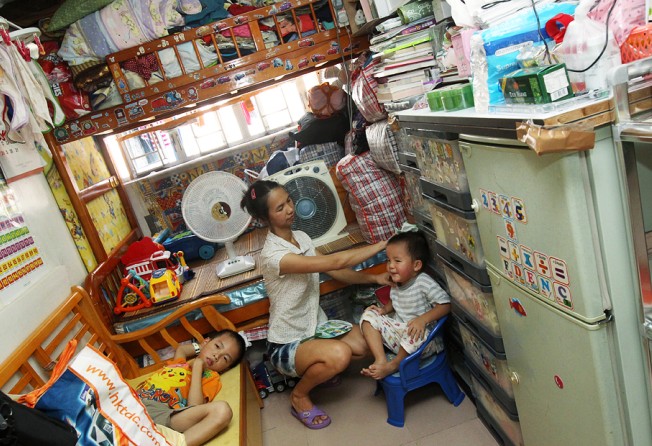‘Dirty’ air in subdivided flats pose health hazards
Air in 35 per cent of units surveyed contain six times more bacteria than in good-quality air, study shows

Air in subdivided units can contain six times as much airborne bacteria than that in good-quality air, research shows.
And this poses environmental-hygiene hazards to residents, increasing their risks of contracting and infecting others with communicable diseases.
In a study jointly conducted by the World Green Organisation and the Baptist University, researchers looked at the condition of air in 20 subdivided units in Tsuen Wan, Mong Kok, Kwun Tong and Kwai Chung between July and September last year.
The study found that in seven of the 20 units surveyed, indoor bacterial counts ranged from 1,168 standard units – or colony-forming units (CFU) – per cubic metre to more than 6,535 CFU per cubic metre.
This was well above the maximum standard of 1,000 CFU per cubic metre that defines good-quality air under Hong Kong’s Air Quality Index.
“The results are quite shocking,” said Baptist University biology professor Dr Lai Ka-man, one of the researchers.
“Many people may think residents in subdivided units don’t care about hygiene, but it’s not like that. It’s their living environment that has caused many hygiene problems.”
The average living area per capita in the units surveyed is about 41 square feet – some 30 per cent lower than the Housing Authority’s 59 sq ft standard for public housing tenants.
Lai said an overcrowded living environment could lead to inadequate ventilation, which would promote the growth of bacterial and fungal colonies.
Poor building conditions, such as water seepage and leaking sewage systems, could release microorganisms and bacterial toxins from the water into the air. Unhygienic surroundings, such as garbage or sewage water accumulating on canopies or in other nearby outdoor areas, would also affect indoor air quality, she said.
The professor suggested residents try taking their clothes to the laundry to avoid increasing air humidity by drying them at home. Residents whose windows faced dirty outdoor areas could keep them closed, she added.
The study also found a higher concentration of indoor bacterial endotoxins in the units than those recorded in previous studies on overall Hong Kong flats.
Endotoxins are a common biological indicator for indoor air quality, although there is no international standard for it. High levels of endotoxin concentration would affect residents’ respiratory systems, especially children with asthma, Lai said.
World Green Organisation chief executive William Yu Yuen-ping said the government should conduct more inspections on air quality in old buildings and clean the buildings regularly. The buildings’ landlords should also be held responsible for providing their tenants with basic environmental hygiene, he said.